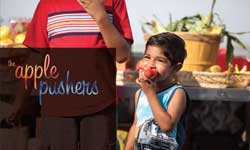Filed Under > TC People
Getting Fresh
They call it the Big Apple, but in some parts of town, finding fresh produce is a tough row to hoe. A new documentary, produced by TC Board Vice Chair Laurie Tisch, highlights a solution
By Siddhartha Mitter
It’s just after dawn, and around New York City, five recent immigrants are hauling carts out from darkened warehouses and loading them up with apples, bananas, peaches, grapes, string beans, broccoli and other produce. During the course of the day, they will appear in neighborhoods across the city, bargaining with wholesalers at the Hunts Point food distribution center in the Bronx, waving down tired commuters exiting the ferry in Staten Island, and above all, selling their wares in the city’s “food deserts”-- parts of town where fresh fruits and vegetables are otherwise not to be found, and where, partly as a result (many experts believe) obesity, diabetes and high cholesterol are endemic.
So begins “The Apple Pushers,” a new documentary directed by Mary Mazzio and narrated by Edward Norton, about New York City’s Green Cart Program, which since 2008 has deployed 500 produce vendors into low-income, food-desert areas in all five boroughs, with another 500 planned. Vendors get priority access to operating licenses, and business guidance and other support from the city’s private partners. And because most vendors are immigrants, the program contributes to their attainment of the American Dream.

